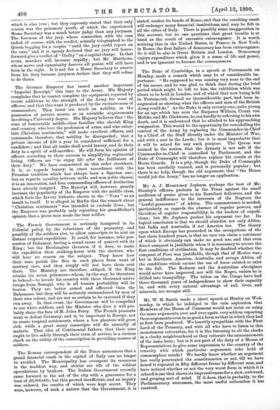The Duke of Cambridge, in a speech at Portsmouth on
Monday, made a remark which may be of considerable im- portance. "He supposed he was coming very near to the end of his career, and he was glad to think that during the brief period which might be left to him, the exhibition which was about to be held in London, and of which that now being held in Portsmouth formed no inconsiderable part, had been in- augurated as showing what the officers and men of the British Army could do." As the Duke is only seventy-one, quite young for an age which has seen the Emperor William, Count von Moltke, and Mr. Gladstone, he can hardly be referring to his own death, and it is understood that he alluded to his approaching resignation. This would be the opportunity for remodelling the control of the Army by replacing the Commander-in-Chief by a Chief of the Staff directly under the Minister of War, and with a seat in the Lords ; but it is most improbable that it will be seized for any such purpose. The Queen was trained in the notion that the dynasty is not safe if the Commander-in-Chief is controlled by Parliament, and the Duke of Connaught will therefore replace his cousin at the Horse Guards. It is a pity, though the Duke of Connaught has been carefully trained, and is personally popular ; but there is no help, though the old argument, that "the House would job the Army," has no longer an application.


































 Previous page
Previous page